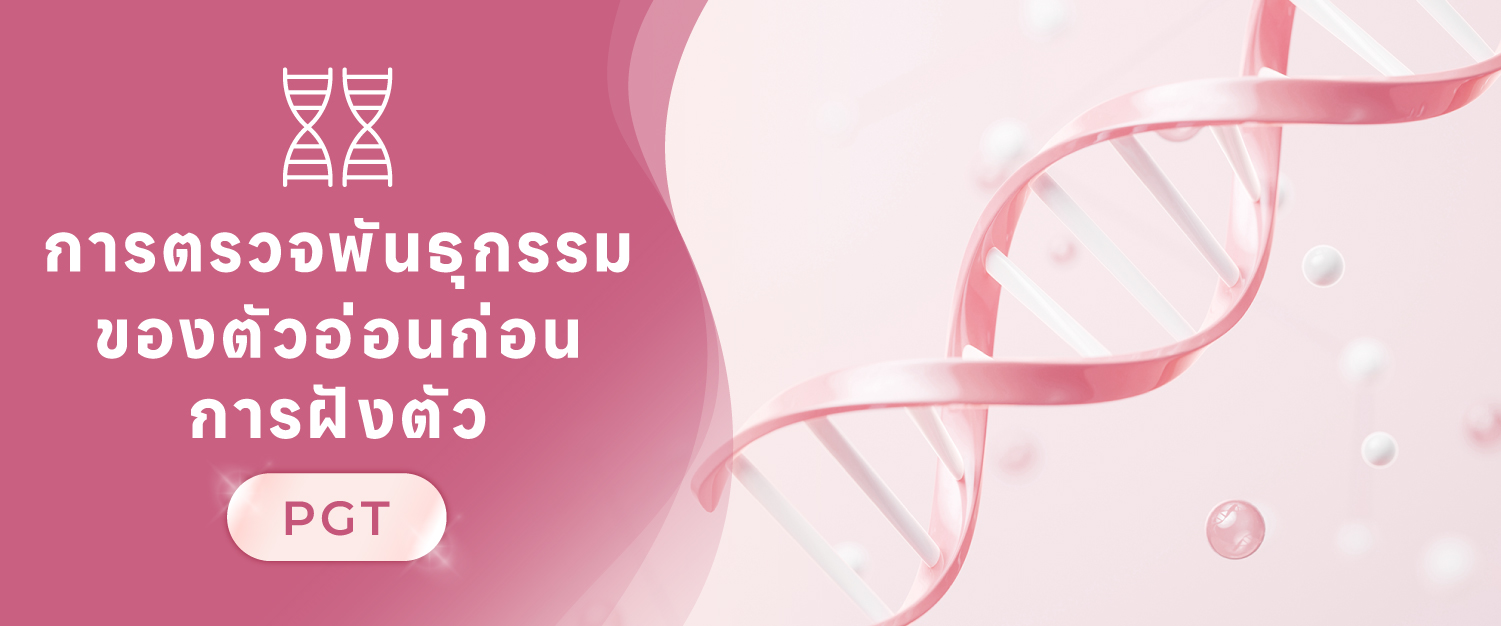
Preimplantation Genetic Testing (PGT)

Preimplantation Genetic Testing (PGT)
PGT refers to genetic testing of embryos before embryo implantation to exclude embryos carrying genetic diseases. It includes PGT-A (testing for aneuploidy), PGT-M (testing for single gene diseases) and PGT-SR (testing for chromosome structural variation).
Through PGT technology, the chance of conception can be improved, the chance of having a normal child can be increased, and the risk of miscarriage caused by embryonic genetic abnormalities can be reduced.
PGT-A
In the past, this technology was called "preimplantation genetic screening (PGS)", which is a key genetic analysis link in the IVF/ICSI treatment process, aiming to increase the probability of successful conception and healthy birth of the fetus.
This technology is particularly important for older women. Studies have shown that more than 50% of older women's embryos have chromosomal abnormalities, and eggs often have missing or redundant chromosomes, namely "aneuploidy", which is one of the main factors causing fetal diseases such as Down syndrome. Through embryo chromosome screening, the probability of healthy conception can be significantly improved, making the treatment more stable and safe, and reducing the risk of miscarriage and genetic abnormalities.
PGT-M
In the past, this technology was called "preimplantation genetic diagnosis (PGD)", which is specially tailored for families with the risk of passing on single-gene genetic diseases. This technology is mainly used to detect and prevent the transmission of specific genetic diseases to the next generation.
With the help of PGT-M technology, in the IVF/ICSI treatment process, the embryo can be deeply analyzed and accurately detected for single gene mutations. Through this process, the risk of newborns suffering from genetic diseases can be effectively reduced.
PGT-SR
Structural rearrangement is a chromosomal abnormality, which refers to the exchange of chromosome segments but the total amount of genetic material remains unchanged, also known as "balanced abnormality". When an individual has an exchange of segments between two chromosomes (reciprocal translocation), genetic material may be lost or repeated during the production of reproductive cells, resulting in chromosomal imbalance in the embryo.
PGT-SR (detection of chromosomal structural variation) technology can detect such abnormalities, reduce the risk of miscarriage, and increase the probability of embryo implantation and healthy pregnancy.
Procedure

PGT-A
PGT-A is an embryo detection technology used in the IVF process. When the embryo is cultured to the implantable stage (blastocyst stage, i.e. day 5), the embryo will have more than 100 cells, of which the inner cell mass develops into a baby and the trophectoderm develops into the placenta. At this time, a small amount of trophectoderm cells are taken as samples for genetic analysis, which does not affect embryo development.
After extracting cells and amplifying DNA, advanced next-generation sequencing (NGS) technology is used for analysis, which can detect 24 chromosomes (22 autosomes and X, Y sex chromosomes) with an accuracy rate of 99.9%, and can also clearly detect chromosome deletions or duplications. Embryos with normal chromosomes will be screened out before implantation into the uterus.

PGT-M
- First, the patient's medical history and genetic test results are reviewed. If necessary, additional tests will be requested to evaluate whether genetic abnormalities in the embryo can be detected. It is recommended to consult a genetic counselor team, who will inform the patient of the advantages and disadvantages of PGT-M testing and analysis based on the patient's specific situation. This test requires a saliva sample from a parent, sibling or relative.
- After completing IVF/ICSI preparation, the doctor will notify the patient to start treatment to cultivate high-quality embryos. When the embryos are cultured to the blastocyst stage on day 5 or 6, a small amount of trophectoderm cells are biopsied for genetic analysis.
- Genetic testing analyzes the embryo's genetic material to detect specific mutations caused by SNPs and uses NGS technology to analyze the number of chromosomes. Finally, disease-free embryos with normal chromosome numbers are selected and implanted into the uterus.
Advantages of PGT-A
- Helps increase the chances of a healthy pregnancy.
- It can improve the pregnancy success rate and reduce the number of treatment cycles before successful pregnancy, thereby reducing IVF/ICSI costs and alleviating the economic burden.
- It can effectively increase the chance of embryo implantation and create better conditions for conception.
- It can reduce the risk of miscarriage and make pregnancy more stable and secure.
